 Society
Society

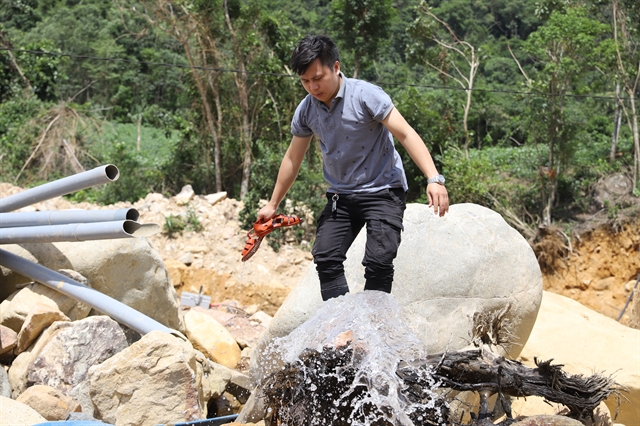 |
| Journalist Võ Mạnh Hùng on a field trip to the landslide area in Hướng Hóa District, Quảng Trị Province. Photo courtesy of Võ Mạnh Hùng |
By Nguyễn Hằng
Journalism ranks among the world’s most dangerous professions, with reporters often navigating hardship, exhaustion and threats to their lives. But it is also a calling rich with experience and moments of deep professional joy.
Võ Mạnh Hùng, working for VietnamPlus online under the Vietnam News Agency (VNA), has spent 13 years in the field.
Recalling his award-winning investigative series Crimes Beneath the Canopy from 2018, his first to win a top National Press Award, Hùng recounted gruelling weeks spent deep within forests across various provinces in the country.
“I spent nearly a month in the jungle,” he said. “About two weeks in the central region and Central Highlands region, the rest in the north.”
In one trek in the forest in Tây Giang District, the coastal central province of Quảng Nam, his sole focus was to reach an illegal logging hotspot.
“I was so concerned about being tailed by poachers that I paid no mind to anything else. It wasn’t until I stopped to rest that I realised both my feet were icy cold,” he said.
“I took off my boots to find them soaked in blood, crawling with leeches. I had to pull them out one by one. The feeling was spine-chilling. All I wanted was to get out of that forest.”
In Đắk Tô District, the Central Highlands province of Kon Tum, he spent three days penetrating remote jungles, riding a motorbike confiscated from poachers and repurposed by forest rangers.
The muddy trails, riddled with deep potholes and slick from rain, were treacherous.
“We had to wrap the tyres with chains to reduce slippage, and when it rains, the brakes would fail completely on descents. Rangers had to tie tree branches to the back of the motorbike to drag along the ground, slowing the descent.”
“I remember riding pillion and feeling as though we were skirting the edge of a cliff. I was terrified,” Hùng said.
Following that trip, Hùng returned to Hà Nội. Then he was hospitalised for 12 days with sepsis at Bạch Mai Hospital.
He had a constant fever of nearly 40 degrees Celsius for 10 days. Only after doctors changed his treatment, he began to recover.
“And within a week, I was back in the forests of Hà Giang Province to finish the series,” he said. “That series took the most blood and sweat in my career.”
On another occasion, having just arrived in the northern province of Bắc Kạn from nearby Cao Bằng, Hùng received a last-minute request from a provincial leader for an interview.
Hùng had one hour to travel 97 kilometres of mountainous roads in the rain to make it on time.
“Parts of the road were still collapsing from landslides. I was terrified, but I pressed on.”
Only after the interview did he feel the chill of what he’d just done because it was raining on the stretch of road, the winding mountain road was very dangerous. And that was the second time he went on a mountainous road, driving on his own.
“The feeling of the hardship was hard to describe,” he said. “In addition to the dangers in the profession, the life of a journalist will encounter many difficult and challenging situations, and they are very sudden and unexpected, requiring journalists to react very quickly.”
Beyond physical dangers, Hùng has also faced threats for his reporting.
“There were times people tried to pressure the editorial board to fire me or threatened violence," he said. "They even sent anonymous complaints to the Ministry of Information and the Việt Nam Journalists’ Association, demanding I stop writing about certain hotspots.”
But Hùng stood firm, bolstered by the backing of his newspaper’s editors. “What I wrote was the truth. They couldn’t silence me. And I kept going back into the field.”
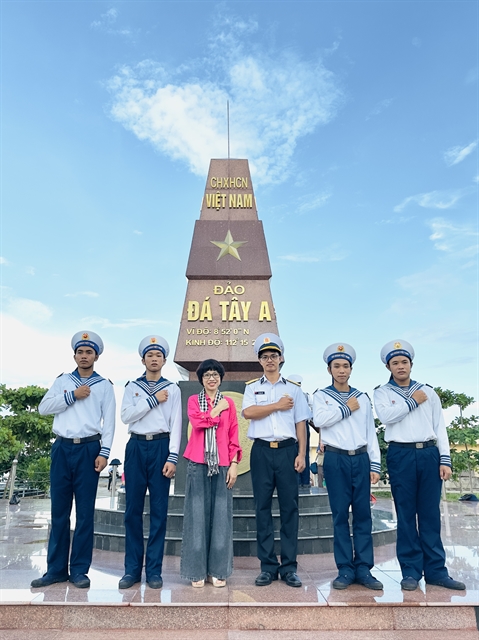 |
| Journalist Phạm Thị Phong Điệp and soldiers during her field trip to the Trường Sa (Spratly) archipelago in May. Photo courtesy of Phạm Thị Phong Điệp |
Enduring hardship, earning experience
Phạm Thị Phong Điệp, a journalist with 27 years of experience and currently deputy head of Culture and Society Desk at the Nhân Dân (People) newspaper, recently returned from a week-long field trip to the Trường Sa (Spratly) archipelago. This was the third time Điệp had visited the islands.
“Working in Trường Sa demands physical resilience. The sea journey is exhausting - rough waves, constant motion - and even without seasickness, the conditions wear you down,” she said.
Reporters had to rise at 4am to handle personal needs amid limited, shared facilities on board a navy ship.
“We had only 3–4 hours on each island, including travel time from the canoe. Choosing what to cover and gathering material under such pressure is a challenge in itself for journalists,” she said.
Covering Trường Sa demands speed, discernment and initiative. Journalists must swiftly identify compelling subjects, locate characters and extract meaningful information. Many journalists have covered Trường Sa before. So, to find something fresh and engaging takes real skill.
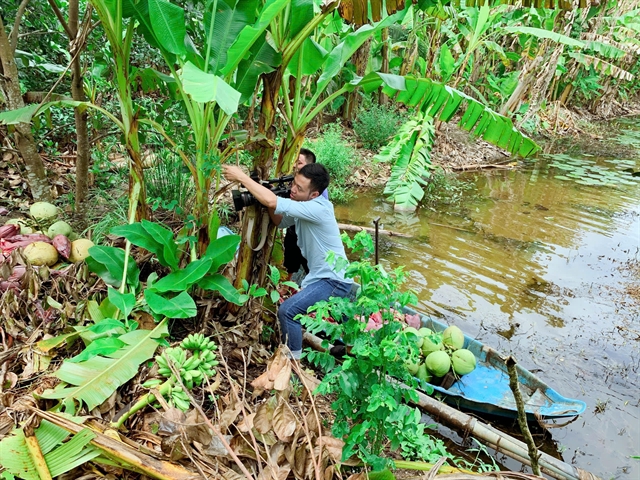 |
| Nguyễn Văn Bình on a field trip to the Mekong Delta province of Cà Mau. Photo courtesy of Nguyễn Văn Bình |
Nguyễn Văn Bình, a cameraman at the VNA’s Digital Content and Communications Centre, has worked across the country in his 15-year career. But it is Hà Giang Province, the northernmost border, that left the deepest mark in his mind.
As VNA’s correspondent in Hà Giang from 2016 to 2019, Bình faced extreme weather, treacherous terrain and language barriers with the local ethnics. In winter, temperatures can drop below zero with snow in places like Mèo Vạc District.
"During flood season, journalists face landslides and flash floods. It’s very dangerous,” he said.
Working in the rainy season, in addition to a raincoat, Bình always required two bicycle chains to wrap around his motorbike tyres to create more friction for it to get through muddy puddles.
“Working in the mountains, if it rains, you can only keep going, because in the middle of the mountains and forests, you don't know where to take shelter from the rain," he said. "If you hide in a tree, you're afraid of being struck by lightning, and if you stop in the middle of the road, you could be hit by a landslide at any time.”
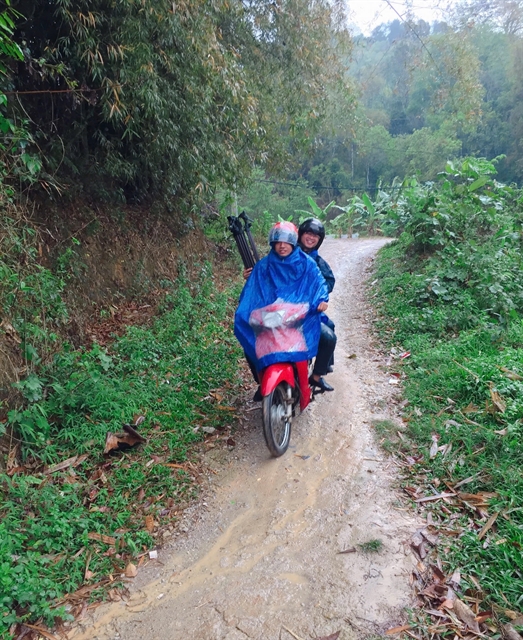 |
| Nguyễn Văn Bình (front) with his colleague on the way to work in the northern mountainous province of Hà Giang. Photo courtesy of Nguyễn Văn Bình |
In 2018, Bình covered a flash flood at a hamlet in Vị Xuyên District. Bình had to travel about 30km to get to the hamlet while the road was very difficult to travel because of the rain.
The flash flood caused the Tham Còn Bridge to collapse and the entire hamlet was flattened. Boulders as large as cars, some the size of houses, had rolled down the mountain. Homes were gone. Incense was already burning when he arrived on the scene, meaning there were fatalities.
“That was my first time witnessing the devastation of a flash flood. It shook me to the core,” he said.
At that moment, Bình was reminded of his colleague, Đinh Hữu Dư, a resident correspondent at the VNA office in the northern mountainous province of Yên Bái, who was tragically swept away by floodwaters on October 11, 2017. He had been reporting on severe flooding near Thia Bridge in Nghĩa Lộ Town when the incident occurred.
“I felt an overwhelming sense of grief,” Bình said. “The pain of Dư’s death came to me through vivid images: how the bridge collapsed, how the floodwaters claimed my colleague. The scene must have looked very much like this one.”
After serving a three-year term as a resident correspondent in Hà Giang Province and witnessing the catastrophic natural disasters there, Bình said he considered them extremely valuable experiences in his life.
Beyond physical challenges, Bình also had to earn the trust of local ethnic communities.
“You can’t just show up with a camera and ask for an interview because local residents need something called familiarity and closeness before they can open their hearts for an interview,” he said.
Bình often helped local households harvest maize in the fields and carry custard apples from the forest to home to build rapport before he could interview anyone.
Professional joy
 |
| Journalist Võ Mạnh Hùng (first left) receives the National Journalism Award's First Prize in 2024. Photo courtesy of Võ Mạnh Hùng |
Hùng has received nine National Journalism Awards since 2013, five of which were First Prizes.
“It’s been a long journey and none of this came easily,” he said. “But VietnamPlus has always trusted and supported me, and that’s priceless.”
"Journalism brings two kinds of happiness," he said. One is being recognised by your peers and institutions. The other, more important, is seeing your work make a positive impact on society.”
Following his 2024 exposé on wasteful and illegal exploitation of mineral resources, the Ministry of Agriculture and Environment issued an official response, thanking VietnamPlus and Hùng, and incorporating his findings into the drafting of the Law on Geology and Minerals.
That law now includes guidance on classifying construction-grade minerals for national projects, decentralised local governance and taxation based on actual output - all issues Hùng had highlighted.
Similarly, his reports on pollution caused by the Sông Lam Cement Plant in the coastal central province of Nghệ An in 2022 prompted investigations and sanctions by authorities.
“Locals called me repeatedly to thank me. Those calls and that gratitude show me the true value of journalism,” he said.
His 2018 series on illegal coal dumping in the provinces of Thái Nguyên and Quảng Ninh led to official crackdowns and even ministry-level meetings.
“When authorities act on what you report and the public feels heard - that is the greatest reward,” Hùng said.
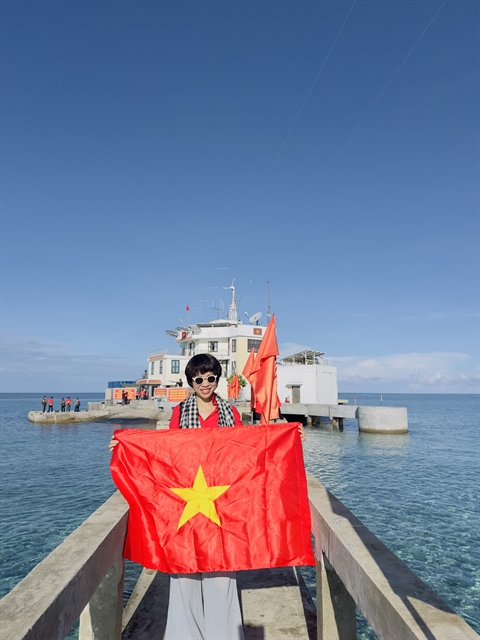 |
| Phạm Thị Phong Điệp at the Trường Sa (Spratly) archipelago in May. Photo courtesy of Phạm Thị Phong Điệp |
Điệp, who has returned from the Spratlys, feels “a deeper love for the country” and a renewed sense of responsibility.
“The sight of young soldiers, barely out of their teens, braving wind and waves to safeguard our islands, is profoundly moving. It makes me ask: What have I done for my country?”
After nearly three decades in journalism, each story has left its mark on Điệp.
“Every assignment has taught me something about life, about the profession, about myself. Journalism compels you to learn, to grow and to strive constantly to do better. The joy of journalism lies in listening, in understanding and in using your pen to speak for those who cannot,” Điệp said.
“And with every new day, every new story, our lives as journalists become richer, and we are compelled to keep going, to find the next story worth telling.” VNS




